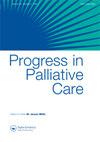Community paramedicine to support palliative care
IF 0.8
Q4 PUBLIC, ENVIRONMENTAL & OCCUPATIONAL HEALTH
引用次数: 4
Abstract
Objective This commentary describes community paramedicine (CP) and the potentiality of an expanded scope of practice to provide home-based palliative care. Background The prevalence of individuals desiring palliative care within their home is growing, requiring the provision of high-quality care. CP is a novel approach to delivering care, allowing paramedics to provide community-based, non-urgent care as well as crisis and symptom management within the home. The need for home-based palliative care at earlier stages of the disease trajectory will be essential for the growing older adult population. Community-based models of care are essential in alleviating health systems burden by reducing emergency department visits and over-reliance on primary care. Methods A rapid review was conducted to determine current scope of practice and geographical coverage of CP programming, as well as a broader literature search describing current roles. Discussion An expanded scope of CP practice that provides palliative care has immense potential in alleviating health system burden while simultaneously improving patient health outcomes. Pilot CP palliative care programs in Alberta, Nova Scotia and Prince Edward Island have demonstrated the benefits of community paramedics providing palliative care through reduced emergency department visits and improved patient satisfaction. Community paramedics are well equipped to provide high-quality palliative care earlier within the patient’s disease trajectory and support the patient and caregiver through remote patient monitoring.社区护理人员支持姑息治疗
目的介绍社区护理人员(CP)和扩大家庭姑息治疗实践范围的潜力。背景希望在家中接受姑息治疗的人越来越多,需要提供高质量的护理。CP是一种提供护理的新方法,允许护理人员在家中提供基于社区的非紧急护理以及危机和症状管理。在疾病发展的早期阶段,对家庭姑息治疗的需求对不断增长的老年人口至关重要。基于社区的护理模式对于通过减少急诊就诊和过度依赖初级保健来减轻卫生系统负担至关重要。方法进行快速回顾,以确定CP编程的当前实践范围和地理覆盖范围,以及描述当前角色的更广泛的文献检索。讨论扩大提供姑息治疗的CP实践范围,在减轻卫生系统负担的同时改善患者健康状况方面具有巨大潜力。阿尔伯塔省、新斯科舍省和爱德华王子岛的CP姑息治疗试点项目证明了社区护理人员通过减少急诊就诊次数和提高患者满意度来提供姑息治疗的好处。社区护理人员配备精良,能够在患者疾病轨迹的早期提供高质量的姑息治疗,并通过远程患者监测为患者和护理人员提供支持。
本文章由计算机程序翻译,如有差异,请以英文原文为准。
求助全文
约1分钟内获得全文
求助全文
来源期刊

PROGRESS IN PALLIATIVE CARE
PUBLIC, ENVIRONMENTAL & OCCUPATIONAL HEALTH-
CiteScore
2.60
自引率
11.80%
发文量
24
期刊介绍:
Progress in Palliative Care is a peer reviewed, multidisciplinary journal with an international perspective. It provides a central point of reference for all members of the palliative care community: medical consultants, nurses, hospital support teams, home care teams, hospice directors and administrators, pain centre staff, social workers, chaplains, counsellors, information staff, paramedical staff and self-help groups. The emphasis of the journal is on the rapid exchange of information amongst those working in palliative care. Progress in Palliative Care embraces all aspects of the management of the problems of end-stage disease.
 求助内容:
求助内容: 应助结果提醒方式:
应助结果提醒方式:


